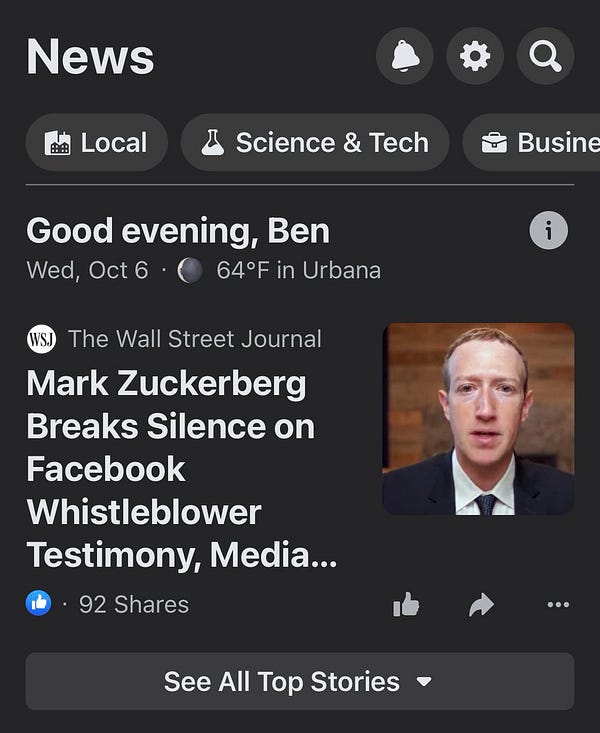Did the Internet stop on Oct 4?
facebook outage in the wider context of the history of the internet
By now, you all probably heard about the Oct 4 Facebook outage. Did the internet stop that day? In some parts of the world, it did. As for a lot of Facebook users, it is more than a social network — it is a help desk, storefront. Also, resource for emergency and health aids.


How could a company solely focused on ad revenues can cripple businesses and communication around the world? This is by design, as Vittoria Elliott writes in the above article:
Facebook’s reach and dominance in much of the world is largely by design. As part of its strategy for exponential growth, the company has made internet access in the Global South — through the use of Facebook products — a priority.
(Restofworld.org does amazing reports on technology and global politics. Check out their various features on Facebook.)
Artist and scholar Ben Grosser posted the question like this:


Here is a brief list of historical events to put this Facebook outage and the global disorientation in context:
We tend to think of everything as cloud, social media, and apps. But before that, before the internet, before IBM, there were the behemoths crunching data. One of the greatest examples of this is a Netflix Prize style competition sponsored by U.S Census Bureau in 1888. Contestants were asked to process old census data from four areas in St Louis. Whoever processed the data fastest would win the lucrative government contract for the 1890 census. Enter Herman Hollerith, a former census bureau employee who completed the data capture in 72.5 hours. Then, he did the data tabulation (i.e., by age category, race, gender, etc.) task in just 5.5 hours. Hollerith later founded that in 1924, was renamed "International Business Machines" (IBM). Even though Hollerith is regarded as one of the seminal figures in the development of data processing, his technology was used by the Nazis.
Remember a giant tech company influenced the election? That was 1961. Before Facebook. Before Cambridge Analytica. The “People-Machine” invented by the “What-If” men elected Kennedy. Check out Jill Lepore’s fascinating look at “The Simulmatics Corporation” that mined data, targeted voters and manipulated consumers. Sounds familiar?
After the 1950s we started to see breakthroughs both in hardware and software. Then came personal computing, the internet -- paving the way for our current surge of data and the increase in computational capabilities. But we still had hardware and software stack then (before the cloud). Software becomes a prominent way to build the world in the late 80s and early 90s (Word, Excel, Power point, photoshop for instance). Benjamin Bratton’s The Stack is highly recommended to understand this change: “A comprehensive political and design theory of planetary-scale computation proposing that The Stack—an accidental megastructure—is both a technological apparatus and a model for a new geopolitical architecture.”
In the beginning, there was also DARPA. History always provides the necessary perspective. Ingrid Burrington’s brilliant 2019 article How We Misremember the Internet’s Origins cautions against apolitical thinking, “By emphasizing the technical innovations (and obsessive dedication to them) as more important than the political and economic contexts in which they were germinated, the graybeards of internet history and PR machines of the tech industry perpetuate the illusion that technology magically exists outside of politics, rather than existing in a constant dialogue with it. The internet emerged in a region heavily shaped by libertarian conservatism and environmental racism, and it was easily instrumentalized toward both—and, in a now-familiar feedback loop, the internet’s ability to amplify specific ideologies further reinforced such polarization.”
From PC, the internet we migrate to the world of Google, Amazon, Spotify, and Netflix and others in the cloud. There is a tendency to view the cloud as immaterial and therefore of little negative consequence for the environment. But there are still racks of servers that can easily overheat. And there are also problems with discarding hardware and mobile devices (e-waste). A newly emerging field called “Discard Studies” is looking into the material aspect of our software and cloud.
From the cloud era, we come to the Big Data world with Francis Fukuyama type proclamation “End of theory” by Chris Anderson (2018) in a WIRED article: “Petabytes allow us to say: “correlation is enough”. We can stop looking for models. We can analyze the data without hypotheses about what it might show. We can throw the numbers into the biggest computing clusters the world has ever seen and let statistical algorithms find patterns where science cannot”. Numerous articles and books have come out in the past years problematizing the notion of end of theory. This requires a whole new post.
While we are transitioning from software/pc based world to the internet/cloud world, suddenly algorithm driven ad revenue becomes the dominant mode of operation. See Charlie Warzel’s discussion with Shoshana Wodinsky on internet ads — “The Internet’s Original Sin”.
Two other books (coincidently by Two Tims) that captures this transition is 1) Tim Wu’s The Attention Merchants: The Epic Scramble to Get Inside Our Heads and 2) Subprime Attention Crisis: Advertising and the Time Bomb at the Heart of the Internet.
I think the Facebook incident pale in comparison to all these mess of software, algorithm, and data history.


